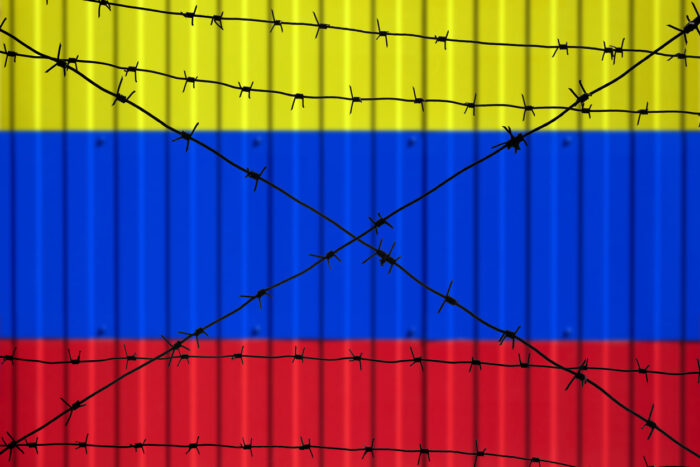Michael J. Camilleri and Fen Osler Hampson
Having put sanctions on Venezuela’s state-owned oil company, the administration should go one step further. One option the Trump administration should consider is to seize the assets of Maduro henchmen that are lying fallow in U.S. bank accounts and make them available to Guaidó’s new government as it becomes able to absorb them, while also repurposing a portion of those monies now to help the millions of Venezuelans who have been displaced from their homes and into neighboring countries.
One of the enduring ironies of Venezuela’s socialist experiment is that even as the country’s economy collapses and its people flee from hunger and disease, a small coterie of well-placed Venezuelans has grown astonishingly rich from corruption.
Two recent cases brought by the Justice Department offer clear examples. The indictment against media tycoon Raúl Gorrín seeks the forfeiture of 24 properties, including an $18 million Manhattan penthouse. Former presidential bodyguard and national treasurer Alejandro Andrade confessed in his guilty pleato receiving more than $1 billion in bribes. Both are accused of money laundering in relation to lucrative deals on Venezuela’s highly distorted currency exchange market.
There are millions, if not billions, of dollars in dirty money that Chavista insiders and generals have stashed abroad.
U.S. sanctions against corrupt Venezuelan officials reportedly led the Treasury Department to freeze $500 million in assets belonging to Tarek El Aissami, until recently the country’s vice president. A systematic, well-resourced and internationally coordinated effort to identify the proceeds of Venezuelan corruption and criminality would find surely more.
The need to seize the money and use some of it to help Nicolás Maduro’s victims is now more urgent than ever. Venezuelans are suffering an acute humanitarian crisis — one its own government denies and refuses to address. Venezuela’s neighbors are also bearing the costs of this crisis. More than 3 million have fled the country, many of them sick, hungry and on foot. Colombia alone houses roughly 1 million Venezuelan migrants and refugees, at an annual cost of roughly $1.5 billion.
Countries in the region have responded with remarkable solidarity to displaced Venezuelans, but national budgets are strained, safety nets are wearing thin and xenophobia is rising. To help the Guaidó government and neighboring countries expand humanitarian assistance, the international community should look to repurposing funds stolen from the Venezuelan treasury to aid their rightful owners, the Venezuelan people — whether they are within Venezuela or outside.
This is not an entirely novel idea. The Justice Department’s Kleptocracy Asset Recovery Initiative seeks to identify, forfeit and repatriate the proceeds of corrupt foreign officials for the benefit of those harmed. Although returning funds to a foreign government runs the risk of simply replenishing the coffers of kleptocrats, the Justice Department has a creative solution. In a civil forfeiture proceeding involving funds from corruption in Kazakhstan, the settlement established a charitable foundation overseen by the World Bank to distribute $115 million for the benefit of poor youths and families, thus bypassing the Kazakh government.
With Venezuela the Justice Department should follow a similar model, moving quickly to deduct reasonable expenses and return the remaining proceeds to Venezuelans when judgments against kleptocrats such as Gorrín and Andrade have been obtained. If this can be done through the Guaidó-led interim government or charitable organizations in Venezuela without putting them or the funds at risk, the money could help alleviate Venezuelans’ suffering and mitigate their need to migrate.
Prosecutors should also take the additional step of using these assets to support international humanitarian agencies, charities and even governments in neighboring countries that are struggling to provide services to fleeing Venezuelans. Congress could help by providing a statutory mandate and framework for such repatriation, which is currently at the Justice Department’s discretion.
Situations like that of El Aissami are more complex. Asset freezes by the Treasury Department pursuant to U.S. sanctions against corrupt foreign officials and their cronies require a far lower bar than a forfeiture proceeding in federal courts. Under U.S. law, frozen assets cannot be seized unless the United States is at war with a foreign country — a situation that does not apply to Venezuela.
However, Congress should consider the creation of a fast-track judicial proceeding whereby the government could seek an order for frozen assets to be confiscated and made available for repatriation, as outlined in a detailed proposal by the World Refugee Council to the Canadian government. Such a proceeding should address evidentiary and due process concerns by providing judicial oversight and offering the sanctioned individuals an opportunity in court to rebut the government’s case that the funds were stolen. Bipartisan Venezuela legislation currently before Congress provides a vehicle to introduce such a measure. If successful, it could be expanded to cover similar situations elsewhere in the world.
The emergence of Guaidó as a viable alternative to Maduro has offered long-suffering Venezuelans hope for the restoration of democracy and brighter days ahead. For now and for the immediate future, however, they will continue to suffer the consequences of Maduro’s catastrophic economic policies. The world should look to the graft-lined pocketbooks of the Venezuelan officials who created the crisis in order to help its victims. This is one issue where the Trump administration and Congress can work in tandem.
The article was first published by The Washington Post.
